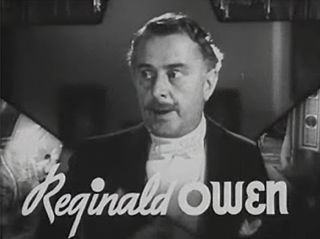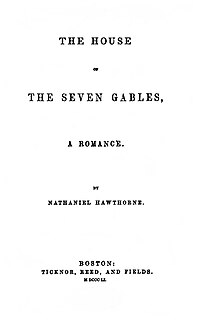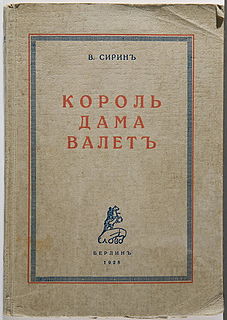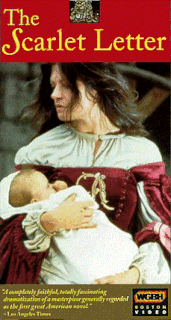
Nathaniel Hawthorne was an American novelist and short story writer. His works often focus on history, morality, and religion.
Adultery is extramarital sex that is considered objectionable on social, religious, moral, or legal grounds. Although the sexual activities that constitute adultery vary, as well as the social, religious, and legal consequences, the concept exists in many cultures and is similar in Christianity, Judaism and Islam. Adultery is viewed by many jurisdictions as offensive to public morals, undermining the marriage relationship.

Anna Karenina is a novel by the Russian author Leo Tolstoy, first published in book form in 1878. Widely considered to be one of the greatest works of literature ever written, Tolstoy himself called it his first true novel. It was initially released in serial installments from 1875 to 1877, all but the last part appearing in the periodical The Russian Messenger.

Effi Briest is a realist novel by Theodor Fontane. Published in book form in 1895, Effi Briest marks both a watershed and a climax in the poetic realism of literature. It can be thematically compared to other novels on 19th century marriage from a female perspective, such as Anna Karenina and Madame Bovary, which are also adultery tragedies.

The Scarlet Letter: A Romance is a work of historical fiction by American author Nathaniel Hawthorne, published in 1850. Set in the Puritan Massachusetts Bay Colony during the years 1642 to 1649, the novel tells the story of Hester Prynne, who conceives a daughter with a man to whom she is not married and then struggles to create a new life of repentance and dignity. Containing a number of religious and historic allusions, the book explores themes of legalism, sin, and guilt.

The Scarlet Letter is a 1995 American romantic drama film directed by Roland Joffé. "Freely" adapted from Nathaniel Hawthorne's 1850 novel of the same name, it stars Demi Moore, Gary Oldman, and Robert Duvall. The film met with overwhelmingly negative reviews. It was nominated for seven Golden Raspberry Awards, winning "Worst Remake or Sequel", and has garnered a legacy as one of the worst films ever made.

John Reginald Owen was a British actor known for his many roles in British and American film along with television programs.

The House of the Seven Gables: A Romance is a Gothic novel written beginning in mid-1850 by American author Nathaniel Hawthorne and published in April 1851 by Ticknor and Fields of Boston. The novel follows a New England family and their ancestral home. In the book, Hawthorne explores themes of guilt, retribution, and atonement, and colors the tale with suggestions of the supernatural and witchcraft. The setting for the book was inspired by the Turner-Ingersoll Mansion, a gabled house in Salem, Massachusetts, belonging to Hawthorne's cousin Susanna Ingersoll, as well as ancestors of Hawthorne who had played a part in the Salem Witch Trials of 1692. The book was well received upon publication and later had a strong influence on the work of H. P. Lovecraft. The House of the Seven Gables has been adapted several times to film and television.

King, Queen, Knave was the second novel written by Vladimir Nabokov while living in Berlin and sojourning at resorts in the Baltic. Written in the years 1927–8, it was published as Король, дама, валет in Russian in October 1928 and then translated into German by de:Siegfried von Vegesack as König, Dame, Bube: ein Spiel mit dem Schicksal. Forty years later the novel was translated into English by Nabokov's son Dmitri, with significant changes made by the author. A film adaptation only loosely based on the novel followed in 1972.

The Scarlet Letter is a 1979 miniseries based on the 1850 novel of the same name by Nathaniel Hawthorne: it aired on WGBH from March 3, 1979 to March 24, 1979. The series is four episodes long, 60 minutes each. Part 2 won the 1979 Emmy Award for Outstanding Video Tape Editing for a Limited Series or Special for film editors Ken Denisoff, Janet McFadden, and Tucker Wiard.

The Book League of America, Inc. was a US book publisher and mail order book sales club. It was established in 1930, a few years after the Book of the Month Club. Its founder was Lawrence Lamm, previously an editor at Macmillan Inc. The company was located at 100 Fifth Avenue, New York City, New York in a 240,000-square-foot (22,000 m2) office building that was constructed in 1906. It printed and distributed a variety of volumes in the 1920s, 1930s, 1940s, and 1950s. A victim of the Great Depression, the Book League of America was purchased by Doubleday in 1936.

The Scarlet Letter is a 1926 American drama film based on the 1850 novel of the same name by Nathaniel Hawthorne and directed by Swedish filmmaker Victor Sjöström. Prints of the film survive in the MGM/United Artists film archives and the UCLA Film and Television Archive. The film is now considered the best film adaptation of Hawthorne's novel.
The Scarlet Letter (1911) is a silent drama motion picture short starring King Baggot, Lucille Young, and William Robert Daly.
American gothic fiction is a subgenre of gothic fiction. Elements specific to American Gothic include: rationality versus the irrational, puritanism, guilt, the uncanny, ab-humans, ghosts, and monsters.

"Thou shalt not commit adultery" is found in the Book of Exodus of the Hebrew Bible. It is considered the sixth commandment by Roman Catholic and Lutheran authorities, but the seventh by Jewish and most Protestant authorities. What constitutes adultery is not plainly defined in this passage of the Bible, and has been the subject of debate within Judaism and Christianity. The word fornication means illicit sex, prostitution, idolatry and lawlessness.

The Scarlet Letter is a 1934 American film directed by Robert G. Vignola and based on the 1850 novel of the same name by Nathaniel Hawthorne.

Ann Hibbins was a woman executed for witchcraft in Boston, Massachusetts, on June 19, 1656. Her death by hanging was the third for witchcraft in Boston and predated the Salem witch trials of 1692. Hibbins was later fictionalized in Nathaniel Hawthorne's famous novel The Scarlet Letter. A wealthy widow, Hibbins was the sister-in-law by marriage to Massachusetts governor Richard Bellingham. Her sentence was handed down by Governor John Endicott.
The following is a list of references to the 1850 novel The Scarlet Letter by Nathaniel Hawthorne in popular culture.
In September 2003, Barnes & Noble Books of New York began to publish The Collector's Library series of some of the world's most notable literary works. By October 2005, fifty-nine volumes had been printed. Each unabridged volume is book size octodecimo, or 4 x 6-1/2 inches, printed in hardback, on high-quality paper, bound in real cloth, and contains a dust jacket. In 2015, The Collector's Library was acquired by Pan Macmillan.

The type of romance considered here is mainly the genre of novel defined by the novelist Walter Scott as "a fictitious narrative in prose or verse; the interest of which turns upon marvellous and uncommon incidents", in contrast to mainstream novels which realistically depict the state of a society. These works frequently, but not exclusively, take the form of the historical novel. Scott's novels are also frequently described as historical romances, and Northrop Frye suggested "the general principle that most 'historical novels' are romances". Scott describes romance as a "kindred term", and many European languages do not distinguish between romance and novel: "a novel is le roman, der Roman, il romanzo".














